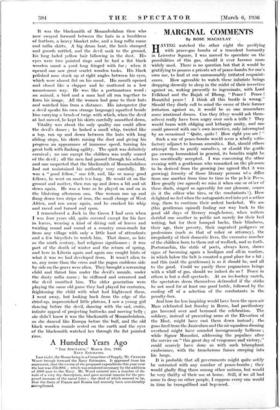• MARGINAL COMMENTS
By ROSE MACAULAY
TTAVING watched the other night the pacifying 11. with peace-gas bombs of a truculent humanity in Leicester Square, I was moved to speculate on the possibilities of this gas, should it ever become more iividely used. There is no question but that it would be gratifying-to possess a private set of peace-bombs for one's 'own use, *to hurl at our unreasonably irritated acquaint- ances. How agreeable to watch these infuriate beings dropping drowsily to sleep. in the midst of their invective against us, waking. presently to ingeminate, with Lord Falkland and the Rajah of Bhong, " Peace ! . Peace Beautiful peace ! I think all this bustle is wrong." Should they dimly call to mind the cause of their former irritation against us, it would be as one remembers some irrational dream. Can they (they would ask them- selves) really have been angry over such a trifle ? They would beam with obliging and lethargic amity, and one could proceed with one's own invective, only interrupted by an occasional " Quite, quite ! How right you are ! " Such a use of peace-bombs would seem a wholly satis- factory adjunct to human amenities. But, should others attempt thus to pacify ourselves, or should the gentle gas enwrap humankind in general, its benefits might be less uncritically accepted. I was conversing the other evening with a gentleman who remarked on the pleasure to 'be derived from the growing (we agreed that it was growing) ferocity of those literary persons NO- o differ from one another from time to .time in the pt b is Press. How greatly (we agreed) we miss it when one or other of these duels, staged so agreeably for our pleasure, ceases (is it the editor who tires, or the combatants 1). How delighted we feel when the antagonists reel into yet another ring, there to continue, their ardent backchat. We are (this gentleman opined) -finding our way back to the good old days of literary rough-house, when writers derided one another in public not merely for their bad writing, but for their humped backs, their blindness, their age, their poverty, their ungenteel pedigrees or professions (such as that of usher or attorney), the irregularity of their dothestic lives, the excessive number of the children born to them out'of wedlock, and so forth. Poetomachia, the strife of poets, always keen, shows signs of becoming again a hooligan and all-in warfare, in which below the belt is counted a good place for a hit ; and this (said the gentleman) is as it should be, and all to the good. Could we pacify these pugnacious beings with a whiff of gas, should we indeed do so ? Peace in others is but a dull spectacle. At an ice-hockey match, the spectators deem themselves defrauded if the sticks be not used for at least one good battle, followed by the cooling off of a selection of the combatants in the penalty-bOx. And how far less inspiring would have been the open-air Mass celebrated last Sunday in Rome, had pacificatory gas hovered over and bemused the celebration. The soldiery, instead of presenting arms at the Elevation of the Host, might have cast them down instead ; the guns fired from the Janitulum and the air kluadion droning overhead might have sounded 'incongruously bellicose ; while Signor Mussolini, addressing the populace after the service on " this great day of vengeance and, victory," could .seareely have done so with such triumphant _exuberance, with the treacherous fumes. creeping into his lungs.
It is probable that all governments might quite safely be entrusted with any number of peace-bombs ; they would gladly fling them. among other nations; but would be very thrifty of their use at home. -Still, if .we all had some to drop on other people, I suppose every one would in time be tranquillised and. bepeticed.
















































 Previous page
Previous page